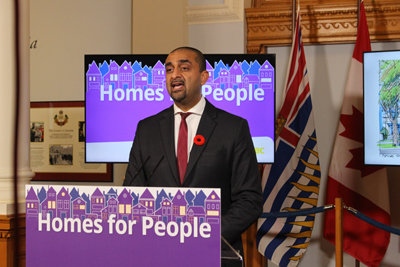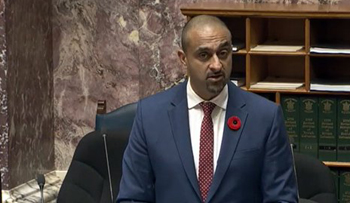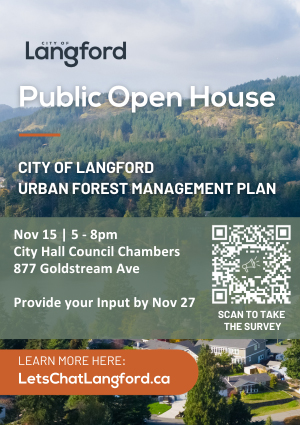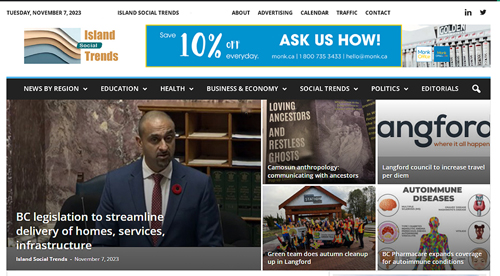Tuesday November 7, 2023 | VICTORIA, BC [Updated 8:30 pm]
by Mary P Brooke | Island Social Trends
Today Housing Minister Ravi Kahlon tabled legislation that takes action to deliver more homes for people faster by making sure that the services and infrastructure people need are there to support the new growth.
“Growing communities need tools to fund infrastructure – but we must move away from negotiations that cause delays, increase costs,and uncertainty,” said Kahlon today. “We’re making sure communities and builders have the tools they need to plan for growth with certainty.”
The legislation is intended to provide greater Certainty Transparency Tools to communities to fund services by streamlining processes this way, we’re not just building homes for people, but also more sustainable, well-planned communities, said Kahlon.
As local governments shift to more upfront planning and zoning, the proposed legislation provides high-growth communities with a more efficient and transparent development-finance tool called an amenity cost charge (or ACC).
Federal collaboration:
“We need the federal government to get into the housing game,” said Kahlon, adding that federal housing minister Sean Fraser “has been a breath of fresh air since coming into that role”. BC is looking for ingenuity, speed and funding when it comes to helping resolve the housing crisis.
Most local municipalities require funding from both the provincial and federal levels of government in order to move forward with more multi-family or high-density housing and associated infrastructure.
Several times today, Kahlon emphasized that up-front funds can be negotiated between municipalities and developers for services like police stations and fire halls. This might help the lag which often occurs between population growth and catching up with basic urban services.

BC Government news release – Nov 7, 2023:
As part of work underway to deliver more homes for people faster, the Province has introduced new legislation to reduce construction delays and streamline processes to fund key services, infrastructure and amenities for growing communities.
“As we take decisive action to deliver the kinds of homes people in B.C. are looking for, we’re also making sure communities and builders have the efficient and transparent tools they need to plan for growth with certainty,” said Ravi Kahlon, Minister of Housing. “By doing this, we’re not just building homes for people, but also more sustainable, well-planned communities.”
Currently, some high-growth municipalities use the rezoning process to negotiate with homebuilders for funding needed for amenities to support the growth and vibrancy of their communities. These negotiation processes can be drawn out, delaying construction and adding additional and sometimes unexpected building costs. These associated delays and costs can affect people buying and renting these homes.
The new legislation, if passed, supports the introduction of Bill 44 to allow upfront zoning, which will facilitate an increase in housing supply in communities throughout B.C. The legislation will require local governments to shift their planning process to an upfront framework, pre-zone land to meet their housing needs, and reduce the use of current rezoning processes.
As local governments shift to more upfront planning and zoning, the proposed legislation provides high-growth communities with a more efficient and transparent development-finance tool called an Amenity Cost Charge (or ACC). Instead of amenity costs and agreements coming together during the rezoning stage, this tool is part of the upfront planning process, giving builders and municipalities a better, clearer and more transparent understanding of costs associated with a housing project from the start.
“UDI is encouraged by this new legislation, which aims to make development charges more transparent and predictable,” said Anne McMullin, president and CEO, Urban Development Institute (UDI). “Combined with the zoning measures announced last week, these are some of the most substantial changes to the development approval process in decades.”
The legislation also makes changes to development cost charges and development cost levies (in the Vancouver Charter). Development cost charges are an existing legislative tool that allow local governments to collect funds from home builders to help pay for specific, core infrastructure needs, such as drainage, water, sewer, and roads, before a development is built. Changes through this legislation will allow local governments the flexibility to allocate funds collected from homebuilders to support additional local services and infrastructure: fire protection facilities (fire halls), police facilities and solid waste facilities that support new homes. Prior to this amendment, one of the only options to recover these costs was through property taxes.
Additionally, cost-shared provincial highway projects, such as interchanges and highway exits that benefit the community, such as accessing a new housing project, are included. For example, if passed, the legislation will allow a municipality to use development cost charges to help pay for a portion of an interchange required to access a new housing project for a large housing project adjacent to a provincial highway. Previously, this would have been paid for by the municipality, often through an increase in property taxes or at the expense of other local infrastructure priorities.
“As we look to tackle B.C.’s housing crisis and build more homes for people, we need to make sure communities have the tools they need to fund these services in a more predictable way,” said Anne Kang, Minister of Municipal Affairs. “Through up-ront funding agreements with builders and developers, local governments will continue to fund and deliver the services people need with more certainty and clarity.”
This legislation will apply to both the Local Government Act and Vancouver Charter and builds on the Province’s recent work to support local governments with the delivery of infrastructure projects necessary to enable community growth. This includes the $1-billion Growing Communities Fund launched in February 2023 and the recently announced $51 million in capacity funding to support local governments’ work to update their processes to meet new requirements to accelerate approval processes and build the homes people need.
Read more about the Amenity Cost Charges:
- Creates an authority to apply an amenity cost charge that is known upfront in the building process, rather than at the zoning stage, creating more cost certainty for homebuilders.
- Allows local governments to continue to impose charges on new development to assist in paying for the capital costs of community amenities (e.g., community centres, recreation centres, libraries) to support liveable communities in areas where they are planning for and projecting increased population growth and housing supply.
- To implement an amenity cost charge, local governments will need to:
Identify areas where more housing supply is planned (based on official community plans and other planning documents) and what amenities are needed to support that supply. Amenity cost charges would apply to new development in those areas. - Determine the amenity cost charge amounts following the rules set out in legislation (for example, the capital costs must be allocated between existing users and new users).
- Consult on the development of the amenities and charge rates.
- Pass a bylaw that implements the charges.
- Local governments can waive or reduce charges for affordable rental housing – as with development cost charges and development cost levies. The Province can also exempt types of affordable housing from amenity cost charges.
- The legislation provides the Province with authority to make regulations, which can be used, if needed, to limit or prescribe further requirements in relation to amenity cost charges and processes.
- The amenity cost charge framework includes checks and balances, such as: charges can only be imposed on development that results in growth and benefits from the amenities.
- Charges are restricted to one-time capital costs, which must be shared between existing and new users – developers only pay the portion assigned to new users.
- Rules to ensure clarity for how the new amenity cost charges work with other tools (such as development cost charges) to prevent double charging.
- Public accountability measures, such as rules about how the charges may be spent.
Updates to development cost charges (DCC)/development cost levies (DCLs) categories:
Updates the scope of infrastructure for which DCCs and DCLs can be collected to include fire protection facilities, police facilities, and solid waste facilities.
- Also allows local governments to collect DCCs/DCLs for provincial highway infrastructure projects under certain conditions:
There is a cost-sharing arrangement between the municipality and the Province. - The highway facilities, in whole or in part, directly or indirectly service the housing development, like an interchange.
- The highway facilities directly or indirectly enable the integrated functioning of provincial and municipal highway systems.
New bylaws must be passed by municipalities:
Local governments will need to update or implement a new development cost charge bylaw to implement the new changes.
The amenity cost charge framework would generally come into force following royal assent. Government will provide guidance to support local governments in implementing the proposed changes and will monitor the implementation as part of ensuring intended outcomes are met.
===== RELATED:
Hoped-for housing explosion based on multi-unit zoning (November 2, 2023)
Clamping down on short-term rentals to free up housing stock (October 16, 2023)










